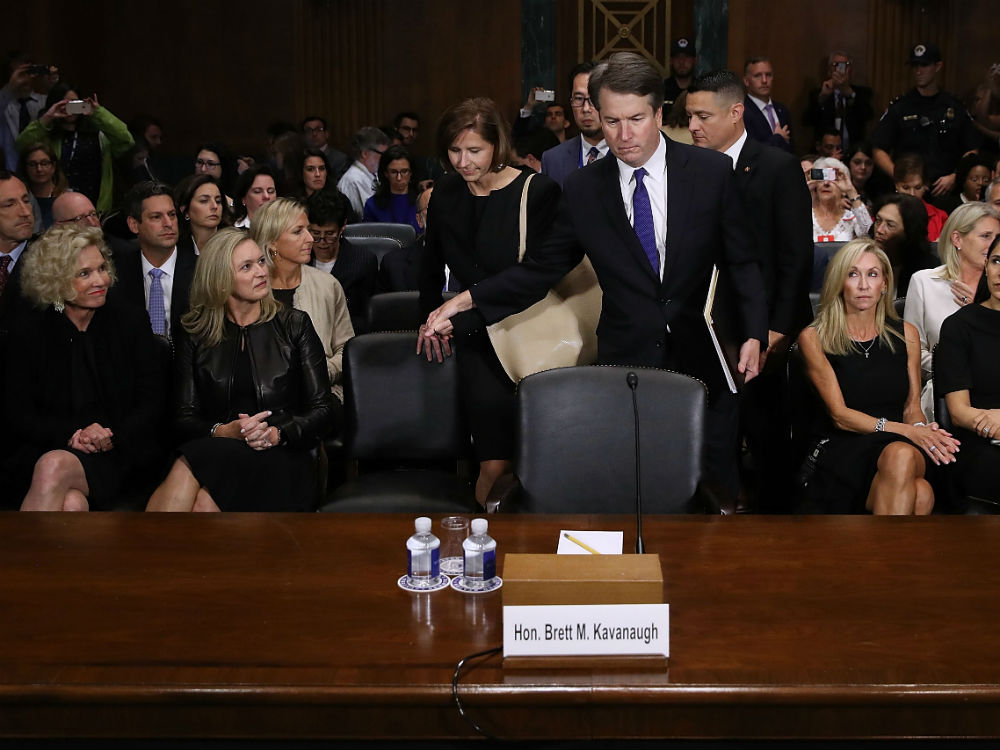
Joel Kaplan’s endorsement of his close friend, the Supreme Court nominee Brett Kavanaugh, has roiled the social network.
On September 27th, Supreme Court nominee Brett Kavanaugh appeared before Congress to answer allegations that he had committed sexual assault. There to support him was one of his best friends, Joel Kaplan, who also happens to be Facebook’s global head of policy.
I made passing note of Kaplan’s attendance here when it happened, and asked readers — particularly those in Facebook’s orbit — what they made of it. Well, now we know. Here’s Mike Isaac in the New York Times:
Mr. Kaplan’s surprise appearance prompted anger and shock among many Facebook employees, some of whom said they took his action as a tacit show of support for Judge Kavanaugh — as if it were an endorsement from Facebook itself.
The unrest quickly spilled over onto Facebook’s internal message boards, where hundreds of workers have since posted about their concerns, according to current and former employees. To quell the hubbub, Facebook’s chief executive, Mark Zuckerberg, last Friday explained in a widely attended staff meeting that Mr. Kaplan was a close friend of Judge Kavanaugh’s and had broken no company rules, these people said.
A similar set of documents appears to have been leaked to the Wall Street Journal’s Deepa Seetharaman, who reaches similar conclusions in her own story.
For Facebook, the controversy over Kaplan represents a new point of division at a company that is still grappling with the Instagram founders’ unexpected departure and the largest data breach in its history. Only when it comes to the Kaplan controversy, it’s not clear to me what the company’s next move should be.
The C suite seems to have been annoyed by Kaplan’s attendance, but was initially dismissive of employees’ concerns. (How concerned are employees? My favorite detail in Isaac’s story is that they went into Kaplan’s calendar and learned that he had not in fact taken the 27th as a personal day, as Kaplan initially stated. The calendar was later updated to reflect that it was, indeed, a personal day.)
In ordinary times, it would not even seem worthy of commentary that a Facebook employee would take time off to go support a good friend’s nomination for a government role. But these are no ordinary times, and this was no ordinary hearing. And among some Facebook employees, who have rallied around Kavanaugh’s proliferating number of accusers, Kaplan’s endorsement of his friend became a workplace issue.
As Isaac notes, Kaplan was hired precisely because of his deep ties to the conservative world. Facebook faces a variety of federal investigations and regulatory threats, and it needs allies in both parties to navigate those waters — particularly these days. Until now, Kaplan’s conservatism has been seen an asset to the company.
It still is — somewhere on Facebook’s communications team right now, I imagine there’s some mild excitement about a news cycle centered on its executives standing up to their more liberal employees in the defense of a conservative colleague. But it can be a liability, too, particularly if a lot of those employees take this opportunity to leave the company to work at an organization that doesn’t have a strategic imperative to make nice with the Trump Administration.
Andrew Bosworth, a 13-year Facebook veteran and Zuckerberg confidante, initially appeared to encourage employees to follow their principles out the door. Here’s Isaac again:
“If you need to change teams, companies or careers to make sure your day-to-day life matches your passions, we will be sad to see you go, but we will understand,” Mr. Bosworth wrote. “We will support you with any path you choose. But it is your responsibility to choose a path, not that of the company you work for.”
But after an employee backlash, Boz walked back his remarks. “I spoke at a time when I should be listening and that was a big mistake,“ he reportedly wrote in an internal post. Another meeting is scheduled for Friday for top executives to listen to employees’ concerns. The trouble for Facebook is that it’s not clear, beyond listening, what Facebook can really do.
Everyone is talking about this story from Jordan Robertson and Michael Riley, which alleges that Chinese spies compromised America’s technology supply chain by inserting tiny chips in servers that reached almost 30 US companies, including Apple and Amazon. Both Apple and Amazon denied this story in the strongest possible terms, going into depth about how why they believe the Bloomberg story to be false. It’s an extraordinary set of events — I hope we learn more. (Facebook appears to have been affected by the hack in a minor way.)
The vice president has called on Google to abandon its China ambitions — a significant escalation of the US government’s pressure on Alphabet, Michael C. Bender and Dustin Volz report:
In a speech that outlined the White House’s long list of frustrations and grievances with Beijing, Vice President Mike Pence called on companies to reconsider business practices in the world’s second-largest economy that involve turning over intellectual property or “abetting Beijing’s oppression.”
“For example, Google should immediately end development of the Dragonfly app that will strengthen Communist Party censorship and compromise the privacy of Chinese customers,” Mr. Pence said in his speech at the Hudson Institute, a conservative, Washington-based think tank focused on security and economic issues.
Nearly 90 percent of accounts that spread disinformation during the presidential election continue to operate and spread or amplify false stories, according to a new study from the Knight Foundation:
Knight Foundation researchers examined millions of tweets and concluded that more than 80 percent of the accounts associated with the 2016 disinformation campaign are still posting — even after Twitter announced back in July that it had instituted a purge of fake accounts.
“The persistence of so many easily identified abusive accounts is difficult to square with any effective crackdown,” write authors Matthew Hindman of George Washington University and Vlad Barash of the social media analysis company Graphika.
I asked Twitter to respond and this is what I got:
“Firstly, this study was built using our public API and therefore does not take into account any of the actions we take to remove automated or spammy content and accounts from being viewed by people on Twitter. We do this proactively and at scale, every single day. Secondly, as a uniquely open service, Twitter is a vital source of real-time antidote to day-to-day falsehoods. We are proud of this use case and work diligently to ensure we are showing people context and a diverse range of perspectives as they engage in civic debate and conversations on our service.”
Two Democrats have asked the Federal Trade Commission to examine whether thousands of apps are violating a children’s online privacy law. Jennifer Valentino-DeVries and Natasha Singer report:
Senators Edward J. Markey of Massachusetts and Richard Blumenthal of Connecticut sent a letter to the Federal Trade Commission on Wednesday saying they were concerned that thousands of apps may “improperly track children and collect their personal information.”
The senators asked the agency to examine whether the apps, and the advertising companies they work with, were violating a federal law to protect children’s privacy online. The law requires sites and apps aimed at children under 13 to obtain verifiable permission from a parent before collecting personal details from a child like an email address, a precise location, a phone number or persistent digital ID codes that are used for behavioral advertising.
WeChat posts the top rumors every month… so it can debunk them. This would be a more heartening development if WeChat were not also a surveillance and propaganda tool of the Chinese government!
The European Union’s data protection supervisor, Giovanni Buttarelli, tells TechCrunch that tech giants are flouting new privacy regulations and he’s not going to take it anymore:
“I did not appreciate the tsunami of legalistic notices landing on the account of millions of users, written in an obscure language, and many of them were entirely useless, and in a borderline even with spamming, to ask for unnecessary agreements with a new privacy policy,” he tells us. “Which, in a few cases, appear to be in full breach of the GDPR — not only in terms of spirit.”
He also professes himself “not surprised” about Facebook’s latest security debacle — describing the massive new data breach the company revealed on Friday as “business as usual” for the tech giant. And indeed for “all the tech giants” — none of whom he believes are making adequate investments in security.













